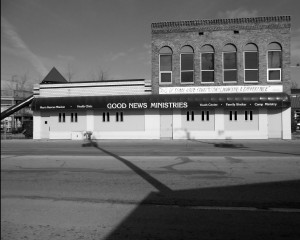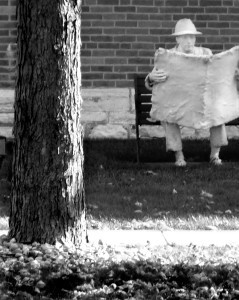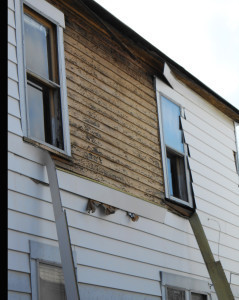Maurice Broaddus's Blog, page 27
May 7, 2013
Telling Our Stories Exhibit – Floyd Wimbush
 One of the projects I did earlier this year (April 4th) was putting on an art exhibit. I wanted to post some of the stories. Floyd is the founder and Executive Director of A New Way of Life. For someone who was the most reluctant about doing the photography class, it turns out he had one of the best eyes for it. We only exhibited the photos closely tied to his story. But if you ask him nice, he might show you his beautiful nature shots. The full Telling Our Stories gallery can be seen here.
One of the projects I did earlier this year (April 4th) was putting on an art exhibit. I wanted to post some of the stories. Floyd is the founder and Executive Director of A New Way of Life. For someone who was the most reluctant about doing the photography class, it turns out he had one of the best eyes for it. We only exhibited the photos closely tied to his story. But if you ask him nice, he might show you his beautiful nature shots. The full Telling Our Stories gallery can be seen here.
Floyd Wimbush
Executive Director of A New Way of Life
Pain led me down the path of addiction. I was an emergency assistance operator in Michigan City. My older brother died in 1989 and something inside me broke. I opened up a log one day and it was the day the call was made that he was killed. I asked the chief for a vacation. He gave me a week. I went to Seattle and stayed out there ten years. My addiction got worse as I got around the wrong people. I started carrying guns, started throwing up gang signs, started manufacturing and selling crack cocaine.
 In 2000, I found myself at Good News Mission. Life was rough. I was still in addiction. I was living with a young lady who got fed up with my addiction and put me out. Good News Mission was more of a work camp back then. Two days a week, for four hours, to job search, while the rest of the time you did work around the building. My objective was to get a job and get back on my feet, but I wasn’t able to do that here because it takes more than four hours a week to find a job.
In 2000, I found myself at Good News Mission. Life was rough. I was still in addiction. I was living with a young lady who got fed up with my addiction and put me out. Good News Mission was more of a work camp back then. Two days a week, for four hours, to job search, while the rest of the time you did work around the building. My objective was to get a job and get back on my feet, but I wasn’t able to do that here because it takes more than four hours a week to find a job.
I left there and ended up staying on the streets of downtown. All I carried was two pairs of pants, two shirts, and one pair of underwear. I came down here and hung out. Downtown seems to be colder than anywhere else in the city. I was still in my addiction so I was drinking a little bit. Thirteen years ago, out in the streets, nowhere to go.
Behind City Market, that was the hang out. You don’t dare hang out there now. I did my begging outside of the City Market. I picked up used cigarette butts for smokes. There also used to be a Burger King. We used to wait there for them to bring out their waste buckets to go through them to get stuff to eat. There used to be a dumpster that sat near there. It was my sleeping spot, drinking spot, bathroom spot. I hid my clothes there. After a couple days of surviving behind the dumpster and on the street, I decided to get clean.
 This would be October 22, 2000. A friend asked me if I was a veteran. I did four years in the Army (1980-1984). So he told me I needed to get out to the VA hospital. After the VA hospital, they housed us at Harbor Lights. In 2001 they moved us across the street to Lucille Rains. I stayed there three years and got married. In 2006, pain drove me to relapse when I got a divorce. I started drinking and doing drugs again, but I was in church.
This would be October 22, 2000. A friend asked me if I was a veteran. I did four years in the Army (1980-1984). So he told me I needed to get out to the VA hospital. After the VA hospital, they housed us at Harbor Lights. In 2001 they moved us across the street to Lucille Rains. I stayed there three years and got married. In 2006, pain drove me to relapse when I got a divorce. I started drinking and doing drugs again, but I was in church.
One day I rode up and down Washington Street, staring at the Salvation Army, until I finally went in. I stayed there a year. Moved out and got an apartment at Washington Arms. It’s an abandoned field now. I stayed up all night, reading my Bible. I was in Romans. After I read chapter 12, I laid down with verses 1-2 stuck in my mind. The Holy Spirit spoke to me in a dream.
From where I came from, I broke through a veil and there was a door. A light was shining, like the sun. There was new life and the Spirit said “Feed my sheep. Take care of your brothers. Renew their minds.” A New Way of Life. I just started writing, putting the plan down on paper right then and there.
There was a for sale sign on this building. I got the number. The real estate agent, a married couple, came out and we walked through it. I shared my vision with them and they said “we ought to introduce you to the owner.”
We met on a Sunday, after church, and I met Mary Howard. I presented my plan to them in the community room. She jumped up and said “we’re going to need beds.” That was the birth of A New Way of Life.
“This has helped me a lot. I really didn’t like taking pictures or having people take pictures of me. Now I’m just going with the flow.”
***
The Telling Our Stories Exhibit was presented at Fletcher Place Arts and Books in April 2013. The full gallery can be seen here. The stories presented include:
-Floyd Wimbush, Founder and Executive Director of A New Way of Life
Telling Our Stories Exhibit – Popcorn
 One of the projects I did earlier this year (April 4th) was putting on an art exhibit. I wanted to post some of the stories. Popcorn, like many of the residents of A New Way of Life, is the story of addiction, bottoming out, and redemption. The full Telling Our Stories gallery can be seen here.
One of the projects I did earlier this year (April 4th) was putting on an art exhibit. I wanted to post some of the stories. Popcorn, like many of the residents of A New Way of Life, is the story of addiction, bottoming out, and redemption. The full Telling Our Stories gallery can be seen here.
Parents don’t understand children sometimes. Sometimes my mom doesn’t know what’s going on in my life. She just thinks she does. Don’t get me wrong, I love my mother. I am her firstborn son. She is a great parent, and she’s been there with me through my recovery. We moved to Lansing, Michigan. I got in trouble for setting things on fire. I ended up in the court system, going into foster care for six years. I lost my family, but I got my education out of the deal. I came back to Lansing in 1987 and graduated from high school. My grandmother passed away and things got worse. I called myself selling drugs. I was doing good for a while but then I tried crack cocaine and I got hooked.
 My mother changed my life and helped me recover from addiction by listening. When I was mad, she sat me down and talked to me. She gave me the encouragement to continue. Visiting me at the rehab center, she showed that she understood what I was going through. She never pushed me away because she believed in me.
My mother changed my life and helped me recover from addiction by listening. When I was mad, she sat me down and talked to me. She gave me the encouragement to continue. Visiting me at the rehab center, she showed that she understood what I was going through. She never pushed me away because she believed in me.
When I was stealing from her, she could have locked me up, sent me to jail, and she could have disowned me, too. I was afraid I was losing her because I had done so much bad to her. It was hurting her, but I was such a wreck. I was off of my medicine. I was destructive. She drove me to Indianapolis for treatment. She talked to the people that ran the program and let them know what I was on. She gave them a better understanding of how bad I was. She put together a family intervention, bringing in my brothers and sisters. I just listened. I asked them what they thought about me. My mother said I was a good person but I have a drug problem and alcohol problem. I needed help to figure out what I was going to do about it. My oldest sister said that I am smart but I do the dumbest stuff. I know better. She said I needed to change my life before I end up dead. That brought tears to my eyes and feelings of guilt and pain. It broke me down.
My mother changed my life just by being my friend. She had faith in me. She took me to the doctor. She paid for the treatment. She went to church with me. She accompanied me to Indianapolis when I needed help for my addiction. She sat down and prayed with me, and some things just started to happen. After we prayed, I just wanted to be the son I was before I was on drugs. I just wanted to make her proud of me. My mom is the best friend that I ever had.
My mother changed my life by giving me a purpose. I was out of control. I used to drink and drive. I used to fight people. I didn’t care. I was not thinking clearly. Life had no meaning. I was foolish. I would just do stupid things. I would just go into people’s houses, even stealing from my mom’s friends, and take things that didn’t belong to me. Nobody trusted me. I had to be real with myself. I admitted that I had a problem. My mother helped me to believe in myself. I was a user, doing wrong things, doing stupid things. I was tired.
 I called my cousin, Floyd Wimbush, who runs A New Way of Life. He told me, “if you’re not serious about it, don’t even waste my time.” But I was serious. On December 30, my mom drove me from Lansing, Michigan to Indianapolis. If it wasn’t for what my mother did for me, I’d be in prison today. I just changed my life. Now I have a purpose: to be clean (I still go to AA meetings) and help others. I sit down with others who need help and pray with them. I listen to them and share my story. I take walks with them. I want to give the gift of friendship. The purpose for each and every one of us is to love one another.
I called my cousin, Floyd Wimbush, who runs A New Way of Life. He told me, “if you’re not serious about it, don’t even waste my time.” But I was serious. On December 30, my mom drove me from Lansing, Michigan to Indianapolis. If it wasn’t for what my mother did for me, I’d be in prison today. I just changed my life. Now I have a purpose: to be clean (I still go to AA meetings) and help others. I sit down with others who need help and pray with them. I listen to them and share my story. I take walks with them. I want to give the gift of friendship. The purpose for each and every one of us is to love one another.
Today I am a caring person. I don’t turn away. I am a loving, giving son. I’m always there for my mother. I am a good friend because I need a friend to be there for me. I love to pay attention to others and give them a shoulder to put their head on, and I am always there for anybody that is a true friend to me. Now I don’t even want to drink. I haven’t had a drink in almost 9 months, and I enjoy it. A new way of life for a new person and that is me. I thank God that there is a place. I changed the way that I think and changed my people. I really feel so good that I am clean and sober and that I’m in a better place with a better life. I am spiritually strong. My health has got a lot better. I really thank my family for their support and there help. I have never been so happy in my life. I thank God for everything he has done for me and my family. I thank God every day and every night for being clean and sober.
***
The Telling Our Stories Exhibit was presented at Fletcher Place Arts and Books in April 2013. The full gallery can be seen here. The stories presented include:
-Floyd Wimbush, Founder and Executive Director of A New Way of Life
Telling Our Stories Exhibit – Laditra Lee
 One of the projects I did earlier this year (April 4th) was putting on an art exhibit. I wanted to post some of the stories. Laditra is one of the board members of A New Way of Life. The full Telling Our Stories gallery can be seen here.
One of the projects I did earlier this year (April 4th) was putting on an art exhibit. I wanted to post some of the stories. Laditra is one of the board members of A New Way of Life. The full Telling Our Stories gallery can be seen here.
I haven’t been in Haughville since 2009 except to drive through on my way to somewhere else. Washington and Tibbs all the way down to Washington and Harding, there wasn’t a thing of beauty there for me. I was born and raised in Haughville. When I was 15, my family moved to the east side. When I started using, around 19 or 20, I found my way back to the west side. I was there for several years, ended up back on the east side, between 10th and New York, my other set of stomping grounds. But my hardest times were on Washington. Out east I wasn’t prostituting or getting locked up. Out west, the game was deeper, the crowd rougher, and I was full throttle with it.
A typical day for me was drinking and making money the best way I knew how to support my habit. Not sleeping, not eating, just constantly using: I woke up using, went to bed using, and in between, I looked forward to using. I was having survival sex, that is, sex to support my basic needs: support my habit, put a roof over my head, having sex to get by. I never saw this community center reach out to anyone in the community. It looked abandoned, a community center with a sealed door when it’s supposed to be a safe haven.
 The house I used to live in is still ugly. It’s dead. No life to it. The house looks like it’s crying. There was nothing of beauty for me in Haughville. It was always sad. I was always depressed here. I thought this whole area was dead. There was no escape route. Every alley had something to catch you. Everyone was a dealer, a prostitute, an addict, a thief, or someone trying to hurt you. There was no good, unless I just wasn’t seeing the good. Every other night I was locked up on this street.
The house I used to live in is still ugly. It’s dead. No life to it. The house looks like it’s crying. There was nothing of beauty for me in Haughville. It was always sad. I was always depressed here. I thought this whole area was dead. There was no escape route. Every alley had something to catch you. Everyone was a dealer, a prostitute, an addict, a thief, or someone trying to hurt you. There was no good, unless I just wasn’t seeing the good. Every other night I was locked up on this street.
I saw a lot of people get killed. I’ve seen people use knives on people just for a hit. I didn’t want to bust someone’s head open just to get high. The more you use, the greater your tolerance and I knew I’d get to the point where I’d have to hurt someone to support my habit.
It came to a head after I’d been up for a few days. It was cold outside and I was on a bend, hadn’t eaten, hadn’t slept. I was a wreck. The people I knew were avoiding me acting like they didn’t want me around. So I called the police, told them I had a warrant out on me, and asked them to lock me up. They said they had no reason to. I told them I was a crack addict and that if they didn’t lock me up, I was going to die that night. I caused a scene, the people started coming outside. The cop suggested that I go inside with them, but I told him it was a crack house which was my problem. The people told him that I had a home and came from a Christian family, so the cop asked if I wanted him to take me to them. But I didn’t want to disturb my family, nor have them see me like that. So I started crying and said “I will die tonight if you don’t help me.” The cop felt sorry for me and took me to the processing center. They didn’t book me, just put me in a cell to let me sleep it off. The next morning, they released me.
 That was February 8, 2008. I was walking down the street, a man approached me and I asked him for a cigarette. That’s how I met Floyd. He gave me a cigarette and then asked me I was just coming out of this building, the processing center, and if I was okay. I said yeah and we exchanged numbers. He said he’d seen pain in my eyes as well as potential and hope. I called him, told him my problems. He shared his experience and recovery. I’d never even heard of an AA meeting. He introduced me to a few places.
That was February 8, 2008. I was walking down the street, a man approached me and I asked him for a cigarette. That’s how I met Floyd. He gave me a cigarette and then asked me I was just coming out of this building, the processing center, and if I was okay. I said yeah and we exchanged numbers. He said he’d seen pain in my eyes as well as potential and hope. I called him, told him my problems. He shared his experience and recovery. I’d never even heard of an AA meeting. He introduced me to a few places.
I had cases pending. I stayed in contact with him through Feb 13th 2008. I was detained and got out Sept 2008. Floyd stayed in contact with me the whole time, sent me a bible, kept my spirits up. When they released me, he took me to a recovery house and stuck with me through a couple of relapses. The first was a fear relapse. Fear of change and even failing. Everything was so new to me and about to be very different. I’d been on the streets for 8 years straight. In 2009, I was back with my family, went to meetings, and was in contact with Floyd. By May of 2009, I was the house manager at Place of Power, when he was putting together ANWOL. I wanted to give back to ANWOL, to repay some of what Floyd had done for me. In May 2011, he asked me to be on his board.
There have been times when things have happened and I literally hear God’s voice saying “Laditra, be still and know that I am God.” He’s showing me “I got this. You’re trying to do this and that, but you’re just one person. You can do all this at one time. Just be still.” You can’t keep repeating the same pattern and expect a different result. You have to do something different.
***
The Telling Our Stories Exhibit was presented at Fletcher Place Arts and Books in April 2013. The full gallery can be seen here. The stories presented include:
-Floyd Wimbush, Founder and Executive Director of A New Way of Life
Telling Our Stories Exhibit – Maurice Broaddus
 One of the projects I did earlier this year (April 4th) was putting on an art exhibit. I wanted to post some of the stories. My “story” explains the theme of the exhibit. The full Telling Our Stories gallery can be seen here.
One of the projects I did earlier this year (April 4th) was putting on an art exhibit. I wanted to post some of the stories. My “story” explains the theme of the exhibit. The full Telling Our Stories gallery can be seen here.
Executive Director of Cities of Refuge Ministries
Telling Our Stories – Why?
We’re a partner organization to A New Way of Life. A lot of our guys have come from there. It’s at ANWOL that they get some traction in their lives, getting a hold of their addiction, some sense of stability. Then they move on to us for greater independence. Like with ANWOL, ours is a relational model. In addressing issues of poverty, we have found that the biggest deficit people struggle with is a poverty of relationships. In our ministry, one of the things that has been most successful is our movie and dinner nights. The simple act of going out with the guys, doing the normal things of life th at many of us take for granted, awakens something in them. Restores a sense of dignity.
 I’m a writer and it occurred to us that perhaps the guys could use is a creative outlet. I could be a hobby as well as something potentially healing. We believe that: art can alter the course of troubled lives, art is a vehicle that can be used to engage people, art can transform people, and art is a collaborative endeavor. Because we were already doing our dinner/movie night, thought try this at ANWOL. We’ve partnered with the LYN House before and they had run the viewfinder Project with some of their kids. The curriculum was perfect for adults.
I’m a writer and it occurred to us that perhaps the guys could use is a creative outlet. I could be a hobby as well as something potentially healing. We believe that: art can alter the course of troubled lives, art is a vehicle that can be used to engage people, art can transform people, and art is a collaborative endeavor. Because we were already doing our dinner/movie night, thought try this at ANWOL. We’ve partnered with the LYN House before and they had run the viewfinder Project with some of their kids. The curriculum was perfect for adults.
The results are seen tonight.
***
The Telling Our Stories Exhibit was presented at Fletcher Place Arts and Books in April 2013. The full gallery can be seen here. The stories presented include:
-Floyd Wimbush, Founder and Executive Director of A New Way of Life
May 6, 2013
So It’s Been a Little Hectic…
Aka, I keep my promise not to solve my relationship issues with threats of urination
I am glad that there are fans of this blog who would like to see me post more often. I really hope to get back to a more regular schedule. Like with most writers I’m juggling a day job (which is complicated to explain to folks, especially once I toss in teaching on the side and my assorted community projects) and finding time to write. I still have a half dozen or so short stories and a novel to write before I see air again, so any free time to write goes there. Then there’s my family. I will tell this story, just keep in mind that I was not created in a vacuum. So for all you people who want to know where my stories come from, here’s a snapshot from my life last week…
Hurricane Mom was in town.
Mom retired to Jamaica a few years ago. She comes back into town once or twice a year for a month, typically around tax time to handle her business. She’s like the Jamaican version of The Godfather. I love my mom, I really do, but hanging out with her is one part chess match (because there’s always some agenda or scheme in full effect) and one part dodging guilt/shame grenades (you know, the way of mothers). Plus, our family has notorious communication issues. You should know this because this story begins with an eviction notice.
Hurricane Mom began her tour by evicting my sister out of her house. Long story, and not entirely unprecedented. My mom once evicted me from one of her condos. You take once too many near misses from one of the guilt grenades and then you decide it’s not worth it to be financially tied to your mother (you know, finally leaving the nest). I should probably mention that the guilt grenade in question involved a lawsuit.
[Before this story develops as many layers as Inception, I’ll just say that my mother likes to file lawsuits by way of prodding people to talk to her. She once sued me and her brother in the same day, then took us out to eat afterwards. Yeah, she could have just picked up the phone, but that’s what normal folks do. And yes, she always has “grounds” for a lawsuit as she won’t loan you $5 without making you sign a contract. Just know that it’s never about the money, it’s always about the relationship: if you just call, the lawsuit gets “dropped.”]
Eventually, you get tired of it and just sort of … stop. Which leads to the eviction. Nearly fifteen years later, I’m watching this play out again with my sister.
My sister clears out then basically goes into the ghetto version of Witness Protection, refusing to let anyone know where she’s staying. It don’t bother me none, cause I can still call her, she still stops by (she’s doing the catering for Mo*Con), plus I follow her on Twitter. Not so much with my mother. So I get declared the intermediary.
You never win the PR battle when the lead is “you kicked your daughter and her three kids out of their house,” not that my mom sees things that way. But, I also know my mom’s been under her own stress, which she informed me of during one of her visits with me [THE FICTIONALIZED VERSION OF THIS VISIT WAS THE BASIS OF THE STORY “READ ME UP” TO BE PUBLISHED IN THE UPCOMING ANTHOLOGY, WHAT FATES IMPOSE. FICTIONALIZED TO MAKE THE STORY BELIEVABLE]. One of her duties in Jamaica is taking care of her mom. Her mom, suffering from “early onset dementia” (it sounds cold, but let me clue you in on something: my grandmother was faking senility early on just to get away with some of her antics until Karma caught up with her), recently broke out of her nursing home. Again. Apparently this was the third time. She scaled the ten foot fences but was caught a few blocks away because she stopped to get in a fistfight with someone. My grandmother is 94. When not in the home, which apparently seems to be more often than not, my mom and her sister are her primary caregivers (there’s 17 siblings total, but that’s a different tale of my grandmother. And my grandfather for that matter.)
You got all that? Good, because here’s where my Thursday gets complicated.
I’m somehow roped from my idyllic life of not caring about any of this into ferrying papers between my mom and my sister. I also am rapidly using up my cell phone minutes as my mom is quick to blow up my phone if I don’t answer. At some point relaying messages, one of them asks “has anyone seen dad?”
My dad is the usual arbiter of “when things go wrong between Hurricane Mom and her children.” My mom and dad split up a few years ago when I turned 40. They are the worst divorced couple ever. Despite the fact that my mom remarried within six months of the divorce (long story, don’t ask. It’s worse than the tale of how my mom and dad got together in the first place), they still talk and buddy-buddy constantly. The main reason they split: she wanted to retire to Jamaica, where she was born. My dad wanted to retire to … the streets, where he lives. For as long as I’ve known him, my dad has hit the clubs every weekend.
As if on cue, dad calls me…to let me know he just got out of jail and he needs my help with something.
Apparently at age 70, my dad is still a teenager. He was out at the club, but decided that he could make it home after an evening of drinking and smoking weed. The police officers of Indianapolis decided otherwise. His problem is two-fold: he needs help getting his car out of the impound yard and, oh yeah, he’s being evicted also and needs to make arrangements for a new place.
Dear Thursday, you can kiss my ass now.
Apparently my dad has issues with Uncle Sam, specifically the whole paying taxes thing, particularly property taxes. Luckily, he’s already found a retirement community (who hopefully doesn’t drug test their residents). So we make a series of calls, do an in person song and dance, get the paperwork relatively turned in and he’s squared away. Now all we have to do is get his car.
My wife is long-suffering and, sadly, long used to the antics of the Broaddus collective. So when I tell her that we have to run down to jail to get my dad’s car out because he was arrested and detained for a DUI and somehow wasn’t buried UNDER the jail in question, her only issue was whether or not we could stop for pizza.
I, on the other hand, had pretty much hit my stress limit.
So I’m in the City-County building, waiting on my dad who is the only person allowed back as he was the offender in question. My wife and sons found a pizza spot to wait on us. I’m trying to charge my phone because Hurricane Mom has worn out my battery with another round of “do you know what your sister did?” (keep in my, the litany of charges against my sister she recited to me were from the early 90s, because there’s no statute of limitations for crimes against your mother). The sheriff strides up to me to tell me to move along because I’m “blocking the walkway.” I stare at him. I look around. It’s 9 pm. I’m the only person in the entire downstairs floor of the building other than the sheriff. He’s proceeds to run off at the mouth to me. I reach for my zipper.
Okay, I know, I know. I’m not a toddler. I’m an educated man. I have a degree in biology. I’m a pretty accomplished writer. I’m active in the community. Solving disputes by threatening to pee on them also isn’t without precedent. First, Hurricane Mom once famously peed in the decorative bushes within the building when they told her she had to wait to go to the restroom. Second, only at the most recent Worldcon, a fan cos-playing as Jesus decided to single me out to chat me up about his ideas about salvation. I may or may not have asked him to get out of my face before I had to pee on my savior. In fact, it was only remembering my friend @emilytheslayer say “Maurice, you shouldn’t pee on Jesus” that gave me pause in whether or not I should pee on the sheriff.
Luckily, while I was paused mid-ethical dilemma, my father popped back up.
Off to Haughville we go in order to pick up his car. As I am the one with the valid driver’s license, I have to drive his car home. My wife and sons give me a slice of pizza to go and me and my dad get into his car. We’re only a few blocks away before I hear “still cold.” I turn to see my father drinking from a half full (because I’m an optimist at heart) bottle of beer. He’s also the soul of politeness because he offers me one of his THREE OPEN CONTAINERS OF THEM.
“Are you crazy?” I ask, using my inside voice. “You can’t have open containers in the car. You know how I drive.” Okay, I may or may not have just been pulled over just the previous week because I typically regard stop signs as suggestions.
“Oh, the booze is a problem. My bad.” At which point he pulls a baggie from the glove compartment to begin to roll one up.
“Dude, I am going to do under the speed limit until we get to your house.”
“Probably a good thing, son. You don’t want to know what’s in the trunk.”
And that is why I haven’t been blogging as often.
Next up: Updates on some of my more recent projects.
May 5, 2013
Securing Your Online Life – Guest Blog by Steve Saus
While I’m still recovering from Mo*Con, Steve Saus wanted a chance to follow up our “Social Media, Stalkers, and Protecting Yourself Online” discussion with this guest post. Then we’ll get back to your regularly scheduled blog.
*
by Steve Saus
There’s no easy segue into this: There are bad people on the internet.
By being a public figure (and honestly, if you’ve written anything and been published anywhere, you’re a public figure), you are a target. A panel I attended at Mo*Con covered a lot of how to protect your life when you live online, and the principles of how to balance privacy and real life.
Slightly overlapping on the Venn diagram of keeping yourself safe are the technical aspects of keeping your online life secure. There’s a lot to know. Even a rough overview covers having good passwords, encrypting your web browsing, knowing the how to effectively back up your data, social engineering, and keeping yourself off of stalker-friendly “people searches”.
I hope the article below, which originally appeared in Volume 47, Issue Two of the SFWA Bulletin1, helps you keep the creepers a little farther away.
1 Presented with permission. Please link back to this document. Thanks.
May 2, 2013
Road to Mo*Con VIII: We Might as Well Call it Food*Con
Okay, so the vibe we go for at Mo*Con is a weekend long catered room party. You know how you’ll be at a convention, night rolls around and you start looking for room parties to crash. How the best ones have food, drinks, and great conversations? They’ve always been my favorite part of going to conventions, so that’s pretty much all we do for Mo*Con. I thought I’d run down our menu for the weekend:
Mo*Con First Friday
(catered by RoE Creations)
-Bruschetta
-Crab crostini
-Mango glazed bacon wrapped shrimp
-Bacon meatballs with gorgonzola and spinach
Mo*Con (our traditional “Alethea Kontis welcome dinner” also catered by RoE Creations)
-Chicken marsala
-Fettucine alfredo
-Salad
-Bread
-Lemon cupcakes
Saturday, May 4th
Lunch (Yats)
Drunken Chicken
Spinach & Mushroom Etouffee
Chili Cheese Etouffee w/Crawfish
Dinner (Shalimar)
Chicken Tikka Masala
Boneless chicken breast cooked in tomato and butter sauce.
Chicken Vindaloo
Chicken cooked in hot and spicy sauce with potatoes.
(Plus a homemade veggie lasagna, so that our vegetarian friends have an option)
Sunday (catered by RoE Creations)
There is no official programming on Sundays, since people are pretty much just hanging out until everyone goes home. As such, The Broaddus Household serves food until folks go home. We begin with Bacon, Eggs, and Biscuits and then we roll into a Jamaican feast of:
Curried Chicken
Jerk Chicken
Rice and peas
Jamaican patties
So, you know, there’s that…
May 1, 2013
Road to Mo*Con VIII: Unmasking by Kristin Fuller
 Kristin Fuller returns to Mo*Con (her previous series was called Ascension) with a new series of photographs. For those not familiar with her work, here is a brief introduction to her.
Kristin Fuller returns to Mo*Con (her previous series was called Ascension) with a new series of photographs. For those not familiar with her work, here is a brief introduction to her.
Statement:
Kristin Fuller likes to take pictures of people and likes for them to tell a story. It could be a true story or a made up one. She loves to take portraits of individuals that are playful, fairytale-ish and have an element of magic in them. Photographs which unmask some truth about a person are her favorite. Technically, Kristin blends antique and alternative process photography with the digital world. She tends to work with older processes, infrared and medium format film and conventional darkroom toning while many times converting these images to digital images in order to edit and process them on various surfaces (tiles, canvases, linen, etc.).
In her most recent series, Kristin explores the complexity of unmasking oneself. Her subject discovers that she wears a secondary face. She is immediately confronted with a mysterious part of herself and realizes that this makes her both terrified and curious. The subject simultaneously desires to remove the newly discovered face as well as flirts with allowing it to replace the one she wears daily. What will she choose in the end? What would you choose if given the opportunity to either destroy the mask you wear or to choose to wear it so naturally that all who see you believe it to be you?
April 30, 2013
Road to Mo*Con VIII: Guest Blog by Janet Harriett
Okay, it’s the week of Mo*Con, so things are crazy on this end (read: I have to edit this novel before the end of the week and get it turned in to the publisher) and I’m trying to put a few projects to bed so that I can enjoy myself. But we have a few more guest blogs. Next up, Apex Book Honcho, Janet Harriett, shares her story.
by Janet Harriett
When I was in that “what do you want to be when you grow up?” stage, I remember my parents being concerned that being a writer would make me depressed. Their concern was not without justification. Mental illness, as the meme says, doesn’t so much run in my family as stroll around getting to know everyone, and I’ve had depression and anxiety to one degree or another for about as long as I can remember. Plus, let’s face it, creative types do have a bit of a reputation for being sometimes fatally not quite right in the head.
My parents really should have been more concerned about my sister’s choice to become a massage therapist. Turns out, as an occupational group, personal care workers have the highest rates of depression, followed by food service, social services, and healthcare. You don’t get to writers and artists until #5. That’s still pretty high on the list, but statistically speaking, “troubled manicurist” is more prevalent than “troubled writer.” (For those interested in the data: http://www.samhsa.gov/data/2k7/depres...)
Creative folks’ reputation, while perhaps undeserved, is not entirely a bad thing. People already expect writers to be a little nuts, so we run into a lot less stigma in admitting that we’ve struggled with mental illness. So, while artists and writers may not lead the pack in having depression, we sure run the table on talking about it.
Talking helps. Not just talking with a psychologist (though I do that, too), but talking with people who have been there. They understand what I mean when I describe thoughts being epoxied in place in my brain until the days run together. They know how terrifying it is to be stuck in a malfunctioning brain that refuses to do what I want.
People who have been on the ledge or held the knife understand the difference between wanting to hurt yourself and wanting to make this all end — a distinction that is often lost even on mental health care practitioners. I still haven’t said the word “suicidal” to my doctor. On the other hand, I have swapped “when I was suicidal” stories with other writers — writers I’ve just met — without fear of judgement, because they talked first.
Calling it the “When I was suicidal story” sounds so flip, but the writer-mental illness combination provides the skill set to turn these experiences into narratives, which make talking about it easier. All the hard work of figuring out what to say is done once, and the anecdote becomes not entirely unlike giving readings. I can tell the story because, in telling the story, it doesn’t quite feel like I’m talking about me.
A good chunk of my decision to be open about my depression came because Jim Hines laid out an eloquent argument in favor of treating mental illness like any other significant medical issue. When I first blogged about my depression, my husband, who has the monumentally difficult task of dealing with me at my worst, asked if I was sure I wanted to do that. The creative world has less of a stigma attached to mental illness, but I can’t blog just to them. Other people would know, too. After the private messages I got from some of those other people, I definitely was sure that I made the right decision. I work in a career field where admitting to mental illness is relatively low risk, but others aren’t so lucky. I got messages thanking me for speaking up, and expressing a hope that they, too, might some day get to a place where they’re comfortable with themselves and don’t fear professional repercussions from their admission.
Talking about it helps me. I have enough anxiety without having to try to keep something else about my life secret. I sincerely hope that, by talking about it, I can pay forward the work others — others who didn’t know me — did, and maybe help break the stigma that keeps people in those four industries above ours struggling silently.
***
Janet Harriett is the senior editor of Apex Publications, as well as a copy editor for hire and occasional writer of science fiction. She lives in central Ohio, fearing the zombie apocalypse after her ill-considered decision to buy a house next to an active cemetery. In her spare time, she has no spare time. Find her online at www.JanetHarriett.com and, more often, on Twitter @janetharriett
***
Mo*Con VIII: The Mind and Spirit of the Artist
May 3 – 5, 2013. Indianapolis, IN
Previous Guest Blogs:
Maurice Broaddus – Being Crazy, Christian, and Creative
April 29, 2013
Road to Mo*Con VIII: Guest Blog by Steven Saus
Okay, it’s the week of Mo*Con, so things are crazy on this end (read: I have to clean the house top-to-bottom) and I’m trying to put a few projects to bed so that I can enjoy myself. But we have a few more guest blogs. First up, editor/publisher Steven Saus reminds us that our mental health isn’t just a “me issue” but impacts those around us and can bleed into our relationships.
Guest Post by Steven Saus
I believe people are usually logical. Give someone a stimulus, combine it with their “givens” – their beliefs and rules about how the world works – and they arrive at a logical, reasonable conclusion.
That’s important to understand about me. It’s a kind of comfort. It is, itself, a given about how the world works for me. It means that other people are reachable. That no matter how bad things have gotten, there is hope. There is a way to reach common ground, to slowly crawl back. It means there is hope for me.
I didn’t really know what codependency was, or how a relationship could be “toxic”…or why someone would stay in a relationship like that for a second longer than they had to. Too often, “codependent” is mentioned in the same breath as alcoholism or drug use – and none of that applied in my case.
The term is even a little confusing. Dependent on each other? Together? That’s supposed to be a good relationship, right? Even St. Paul – in one of the more misquoted bits of the Bible – argues that each person in a relationship takes care of the other… and lets the other take care of them.
And it can go so horribly, horribly wrong.
It’s hard to find good, simple definitions of codependent or toxic relationships. Codependency is a dependency on other people’s moods, behaviors, sickness, well-being, and love for happiness. A codependent relationship is one where other people’s moods control my emotions so I try to control their feelings. A codependent is a person who has let another person’s behavior affect them and who is obsessed with controlling that person’s behavior. That was me.
It’s hard to write about my codependency now. I remember it. I remember how awful, how trapped, how hopeless I was. But I don’t understand my own reasoning any longer. My givens have changed.
I know the process was gradual. People are not born codependent. They are trained. A thousand little interactions, a thousand times left confused and upset, a thousand times knocked off-balance and trying to figure out how I, once again, ended up being the bad guy. A thousand little nudges to my assumptions about how the world works.
The axioms about boiling frogs are largely true. Increase the heat slowly, slowly, and the frog will never think to jump out of the pot. I did not pay attention to the slow, small changes, the little nudges that ended up twisting my worldview. The nudges that eventually left me in front of Despair’s mirror. I was about to quit college a term away from graduation. To stop writing fiction. To stop blogging. To stop going out. For the second time in my life, I seriously considered killing myself. The despair was far, far deeper than anything I’d felt while clinically depressed. The water was boiling, and I barely noticed.
It took someone else to point out the bubbles and the heat.
And even though the air felt frighteningly freezing, I slowly – so fucking slowly – crawled out of the boiling water.
It was messy. It was slow. It was almost two years before I truly began to understand how badly skewed my worldview had become. Another year has passed, and I’ve finally gotten to a point where my head is largely screwed on straight. It’s often been two steps forward, one step back, a step to the side, and a small jig. But the direction of progress has stayed the same. During that time I badly hurt people I care deeply about. That’s why I am writing this.
I call my situation “codependent”, but more broadly, you can call it a toxic relationship. It’s irrelevant to assign fault or blame. It’s a waste of energy to assign motivation to the other person. It simply doesn’t matter. The structure of the relationship will perpetuate the toxicity. The other person might be malicious. They might be scarred themselves. These things Do. Not. Matter. You can only observe their behavior, and decide whether or not to accept it. You are in charge of what you let into your life. You control your givens.
Toxic relationships could be anywhere – not just in our romantic lives. They’re in the way we interact with our families. In our offices and our workplaces. It’s embedded in our culture. We have to be awake, aware, and alert to recognize what’s happening. It’s hard to recognize the toxic elements of a relationship – even when the whole thing has gone sour – when you’re in the middle of it. Like depression, you may be aware there’s a problem, but not what the problem is, or where it comes from.
Naming it gives you power.
If you’re not sure about your relationship, or just think there’s something wrong, try reading “Sick Systems: How to Keep Someone With You Forever”. If it resonates with your current situation, that’s a strong signal. Melody Beattie’s classic “Codependent No More” was invaluable in extracting myself from a codependent relationship — once I realized that it applied to my situation. ”How to Avoid Problem People”, while specifically directed toward romantic (and sexual) relationships is a SFW post that has a lot of good tips and practices for staying out of those kinds of relationships in the future.
I’m heartened to see more and more things pop up about toxic relationships. Learn them. Educate others. Know what your boundaries are for letting other people – other behaviors – into your life.
If you’re already in a toxic relationship, if things seem hopeless, it is possible to get out. It is possible to find a way out of – or through – your situation. I believe this. It’s a given.
***
Steven Saus injects people with radioactivity as his day job, but only to serve the forces of good. His work has appeared in anthologies and magazines both online and off. He also publishes and provides publishing services as Alliteration Ink. You can find him atstevensaus.com and alliterationink.com.
References/Resources
Sick Systems: How to Keep Someone With You Forever
All quotes defining codependency are from “Codependent No More” by Melody Beattie.
***
Mo*Con VIII: The Mind and Spirit of the Artist
May 3 – 5, 2013. Indianapolis, IN
Previous Guest Blogs:
Maurice Broaddus – Being Crazy, Christian, and Creative







